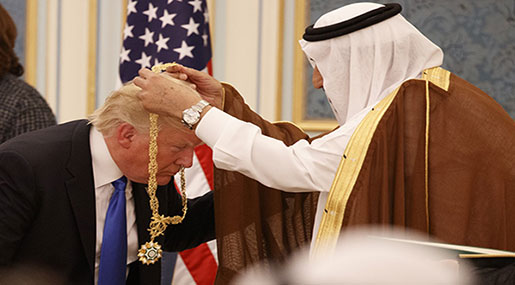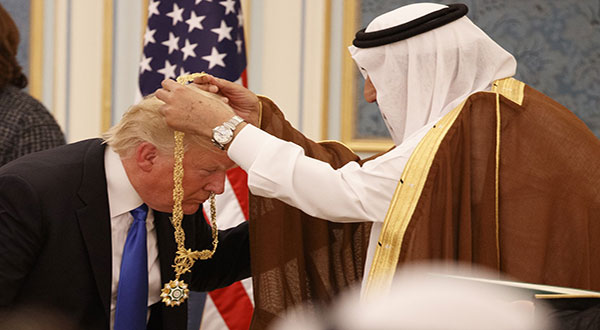
Senate Opposition to Saudi Arms Deal Growing

Karoun Demirjian, Anne Gearan
US Democrats in droves are set to cast a protest vote against President Donald Trump's proposed arms sale to Saudi Arabia, a move that may not prevent the deal from going through but nonetheless represents an unprecedented rebuke of Saudi Arabia's activities in war-torn Yemen.

Senate Minority Leader Charles E. Schumer [D-NY] announced Monday that he would vote against a sale of precision-guided munitions to Saudi Arabia, clearing the way for many other Democrats to follow suit. That means they, and resolution sponsor Sen. Rand Paul [R-Ky.], may need only a few more Republican votes to throw an obstacle in the path of Trump's plans to see through a contract worth more than $500 million. The measure is expected to come up as soon as Tuesday.
If critics of the sale are successful, it would mark the first time in decades that a body of Congress summarily rejected an administration's attempt to conclude a ‘defense' deal with Riyadh. Even if opponents only come close, the repudiation by almost half the Senate of Saudi Arabia's privileged status in such deal-making would be a political setback with potential implications for Saudi influence in US policy.
"It's a warning shot across the bow for both the Trump administration and the Saudis," whether the measure passes or not, said Scott Paul, humanitarian policy adviser for Oxfam America, which has opposed the sale. "It says that in the future, no one should expect US support to be a blank check."
Last year, an effort to block a tank sale to Saudi Arabia led by Paul and Sen. Chris Murphy [D-Conn.] - also the chief forces behind this week's resolution of disapproval - garnered the support of only 27 senators, four of them Republicans. But that measure came up during a month in which Saudi Arabia suffered an uncommon political defeat on another front, as senators nervous about upsetting the alliance still voted 99 to 0 to override President Barack Obama's veto of a bill giving the families of Sept. 11 victims a chance to sue Saudi officials over alleged support for the perpetrators of the attacks.
Meanwhile, there is a difference between this year's measure and last year's resolution: The weapons in question last year were tanks, whereas this year, weapons on offer are precision-guided munitions that human rights, arms control and humanitarian organizations believe Saudi Arabia is deliberately misusing to target Yemeni civilians and destroy infrastructure, worsening an ongoing famine.
The State Department has argued that the US oversight that comes with such sales, combined with increased US training and engagement with the Saudi military, gives Washington leverage that it would lose if the sales were halted as a protest.
But senators opposed to the transaction argue that the Trump administration's policy is willfully turning a blind eye to widespread suffering in Yemen by greenlighting the sale of weapons the Obama administration halted late last year.
"We're voting on a portion of the sale that President Obama would not make . . . and President Trump is moving forward on," said Murphy, who pointed to the munitions and argued that Saudis are "not telling the truth" about how they are using them to worsen a humanitarian catastrophe in Yemen.
"There's a growing recognition that we are contributing to a cascade famine inside Yemen," the senator said.
As reasons to vote against the sale, some Democratic senators noted not only their humanitarian concerns but also increasing frustration with Saudi Arabia's support for groups promoting extremist ideologies.
"Of equal concern to me is that the Saudi government continues to aid and abet terrorism via its relationship with Wahhabism and the funding of schools that spread extremist propaganda throughout the world," Schumer said in a statement announcing his opposition to the deal.
Others noted that selling weapons that have been identified as exacerbating the crisis will do little to end the conflict...
The chorus of reactions stands in stark contrast to the political line from the president since he visited Riyadh as part of a nine-day foreign trip. In the weeks since, Trump has repeatedly spoken of his respect and close alliance with King Salman bin Abdul Aziz, boasting of "tremendous" deals he made with the Saudi leader.
The arms deals are also necessary for the Saudi war effort, according to Bruce Riedel, a Saudi expert with the Brookings Institution, who pointed out that without US munitions, the Saudi military "is seriously diminished."
Senators opposing the deal need to collect only a simple majority of votes this week to carry Paul and Murphy's motion.
While momentum is in the hands of those opposing the sale, they face difficult hurdles that may keep them from a win in the Senate. And even if the Senate does vote against the deal, the House would have to follow suit, and both chambers would have to withstand a presidential veto to keep it from going through.
Still, Saudi watchers note that the kingdom has never skirted this close to defeat - and that alone will have reverberations in the US-Saudi relationship.
"A no vote would be a stunning defeat for both Saudi foreign policy and the Trump administration's Middle East policy," Riedel said. "It would also be an enormous setback for the huge Saudi lobbyist machine in Washington."
The kingdom has hired Washington lobbyists to shepherd the deal. A spokesman for one of the firms representing Saudi Arabia declined to comment Monday.
Source: Washington Post, Edited by website team
Comments



